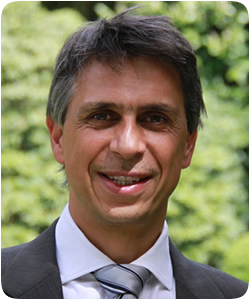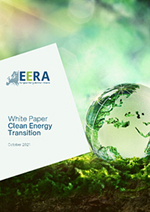Our planet is burning and drowning. Science provided the technologies, experts a credible
transformation roadmap.
Now politicians should deliver. Immediately and fast. Very fast.
 After the stark conclusions of IEA's "Net Zero by 2050", last summer brought us a spate of ultimate wake up calls, providing undeniable scientific evidence of the unprecedented and irreversible biophysical transformation of our planet. It is burning, it is drowning, and plant and animal species are dying. Human life on earth is challenged.
After the stark conclusions of IEA's "Net Zero by 2050", last summer brought us a spate of ultimate wake up calls, providing undeniable scientific evidence of the unprecedented and irreversible biophysical transformation of our planet. It is burning, it is drowning, and plant and animal species are dying. Human life on earth is challenged.
On August 9, the Intergovernmental Panel on Climate Change (IPCC) released the first part of its Assessment Report 6 pertaining to the Physical Science of Climate Change. "Many of the changes observed in the climate are unprecedented in thousands, if not hundreds of thousands of years, and some of the changes already set in motion - such as continued sea-level rise - are irreversible over hundreds to thousands of years", the assessment claimed.
Under the most optimistic scenario, the earth is set to warm by at least 1.6°C in the coming decades. In addition, such warming is expected to have a much higher and severe impact than anticipated on all human activities and living conditions.
More recently, the Intergovernmental Science-Policy Platform on Biodiversity and Ecosystem Services (IPBES) warned that about a third of all analysed plant and animal species are under severe stress, evoking the possibility of a sixth mass extinction: "We are eroding the very foundations of our economies, livelihoods, food security, health, and quality of life worldwide" reads the report.
Adding to the emergency, just a few days ago, an editorial published in 220 newspapers, including some 20 prestigious scientific journals such as The Lancet, and the British Medical Journal, alerted about the deterrent effect on human health of combined global warming and collapse of biodiversity. "Science is unequivocal; a global increase of 1.5°C above the pre-industrial average and the continued loss of biodiversity risk catastrophic harm to health that will be impossible to reverse", the editorial alleged.
Then, how can we still avoid complete chaos?
First, the IEA report was clear. To reach net-zero by 2050, half of abatements after 2030 will have to come from new or currently pre-competitive technologies. It warned that achieving such a historical surge in clean technologies development can only be envisaged by the massive and unprecedented growth of investments in research and innovation and the accelerated deployment of these technologies.
However, the parallel development of global crises and the increasing recognition of their strong interconnection starkly underlines the absolute necessity of addressing our planet’s issues from a holistic and systemic perspective: climate, biodiversity, food, water, and other planet resources are intrinsically interlinked into a global system on which, let us read it carefully, human life on earth depends.
In this sense, only deploying faster than any time before both existing and future clean technologies will not be enough. Our society needs to be radically transformed. In fact, the "Clean Energy Transition" should be more accurately called "The Societal Sustainability Revolution".
This latest concept compels us to fundamentally redesign the siloed approach that has been "hard-coded" in the very foundations of society and therefore imprinted in individuals' mental structure. It also suggests that our current economic paradigm might not result from any "universal law". As such, it must be profoundly revised in a way that steers human action towards more desirable transformation pathways, dictated by the principles of a global, holistic, interdisciplinary, and fair science-based "benefit-cost" analysis.
Science has unequivocally and repeatedly alerted us of the eminent dangers humanity is facing. But besides these emergency warnings, it has also provided us with some light and hope. It tells us that containing global warming below 2°C might still be achievable if immediate, bold, and concerted action is taken globally.
For instance, the IEA Net Zero report provides a concrete roadmap to decarbonise our global economy in just three decades. But this roadmap is not an easy journey. It proposes to reshape our economy and energy system profoundly. Furthermore, it calls for a transformation of our society, including driving citizen's towards more responsible consumption patterns.
Echoing the need for a global transformation, the EERA White Paper on the Clean Energy Transition is a first and landmark attempt to break existing governance and policy silos by proposing a transition approach towards climate neutrality that is more consistent, integrated, and convergent. This publication constitutes the first step to challenging our common thought process towards a more systemic understanding of the daunting and pressing challenges human society faces today.
Moreover, this paper ambitions to fuel the debate on the need for an almost societal metamorphosis and seed the reflection to redesign human innovation capabilities. Its key recommendations to policymakers highlight the crucial importance of building collective adhesion to a new co-created societal model. It calls for developing a coherent, robust, and appealing storyline outlining transformation pathways towards a desirable common, sustainable, and climate neutral future. Such a narrative must provide a credible and tangible vision of resilient transition pathways enabling citizens and society at large to envisage and endorse the transition process by connecting individual imaginaries into a converging collective sustainable future.
Ultimately, the path forward is outlined. It is narrow and fragile. Policymakers around the world have now a historic responsibility to act immediately, collaboratively, and decisively.
 The EERA White Paper on the Clean Energy Transition will be officially released at the occasion of the high-level policy conference "Clean Energy Transition: From Vision to Reality" that will take place on October 20 in a hybrid format, in Brussels and online.
The EERA White Paper on the Clean Energy Transition will be officially released at the occasion of the high-level policy conference "Clean Energy Transition: From Vision to Reality" that will take place on October 20 in a hybrid format, in Brussels and online.
We invite interested stakeholders to join us at this occasion to learn and debate on EERA's recommended approach to driving the Clean Energy Transition.
About EERA
The European Energy Research Alliance (EERA) is the association of European public research centres and universities active in low-carbon energy research. EERA pursues the mission of catalysing European energy research for a climate-neutral society by 2050. Bringing together more than 250 organisations from 30 countries, EERA is Europe's largest energy research community. EERA coordinates its research activities through 18 Joint Programmes and is a key stakeholder in the European Union’s Strategic Energy Technology (SET) Plan. In line with its mission, EERA is committed to supporting Europe in achieving a successful energy transition in line with the EU's climate 2050 goals and Paris commitments.
For further information, see https://www.eera-set.eu
Email: a.elgammal@eera-set.eu | LinkedIn